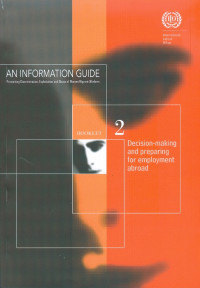
Text
Booklet 2 decision-making and preparing for employment abroad
Poverty in their communities of origin is a major push factor. For most women as well as men migrants, the main reason for working abroad is the lack of income earning opportunities at home and the potential of earning several time higher incomes abroad. Due to existing gender inequalities and past and present discrimination against women and girls in society and the labour market, women as compared to men often have fewer prospects of finding gainful employment or are unable to secure stable employment at home. They are also generally more seriously affected by social and economic reform policies; for example, women experienced higher unemployment than men when the previous socialist countries made the transition to market economies. Women migrate to fulfil their economic/occupational role – especially where they are the main breadwinners fortheirfamilies,ratherthan their conjugal role (more and more, it is the wife rather than the husband who is able to find a job abroad or who gets a job first) 5 or their maternal role (mothers are having to leave the care of their children to other family members). For young, unmarried women, the motivation may be the desire to repay their parents fortheir upbringing or to contribute to the education of their siblings by earning well and sending home remittances. As an important survival strategy or risk aversion strategy, poor families encourage female members to work abroad and to send remittances home for the support of those left behind – especially aged parents, young children and siblings going to school. In many parts of the world, there is a growing trend of women taking responsibility for the survival of the whole family and looking for new sources of income: there are more single mothers, female heads of households and Booklet 2 13 female sole breadwinners. In many cases, women in the household may have better chances to secure a labour contract abroad and are urged by theirfathers, brothers or husbands to migrate and try to secure jobs for their male relatives. For a married woman with children, her ability to migrate may depend on whether other family members can take over her domestic responsibilities – where there is an extended family structure, this is more likely. In rural areas, unmarried daughters are often singled out for migration because they are not needed for agricultural work or as household help and do not have viable employment alternatives in the village. An extreme case would be young women and girls who are sold to traffickers by their families to pay off family debts
Availability
| KP X.000130 | KP X.LIM d | My Library | Available |
Detail Information
- Series Title
-
An information guide preventing discrimination, exploitation and abuse of women migrant workers
- Call Number
-
KP X. LIM d
- Publisher
- Jenewa : International Labour Organization (ILO)., 2006
- Collation
-
60p. ; 29, 5 cm.
- Language
-
English
- ISBN/ISSN
-
9221137635
- Classification
-
KP X
- Content Type
-
-
- Media Type
-
-
- Carrier Type
-
-
- Edition
-
-
- Subject(s)
- Specific Detail Info
-
-
- Statement of Responsibility
-
-
Other version/related
No other version available
File Attachment
Comments
You must be logged in to post a comment
 Computer Science, Information & General Works
Computer Science, Information & General Works  Philosophy & Psychology
Philosophy & Psychology  Religion
Religion  Social Sciences
Social Sciences  Language
Language  Pure Science
Pure Science  Applied Sciences
Applied Sciences  Art & Recreation
Art & Recreation  Literature
Literature  History & Geography
History & Geography